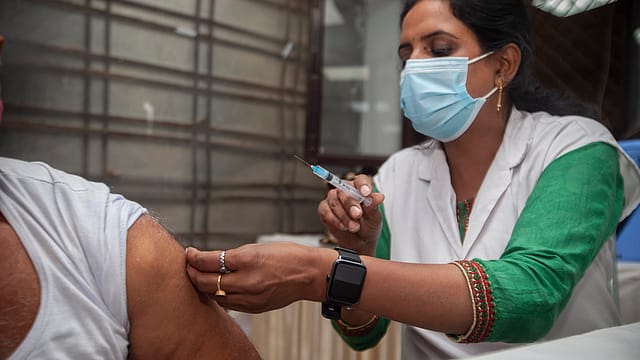Economic Survey 2023: India administered over 220 crore Covid-19 vaccines
ADVERTISEMENT

The Economic Survey 2022-23, tabled by Union Minister of Finance and Corporate Affairs Nirmala Sitharaman in the Parliament today says that as on January 6, 2023, India has been able to administer more than 220 crore Covid-19 vaccine doses across the country.
About 97% of eligible beneficiaries have already received at least one dose of Covid-19 vaccine and around 90% have received both the doses. Also, 22.4 crore precautionary doses have been administered, she says.
India's National Covid-19 Vaccination Programme, which is the world's largest vaccination programme, began on January 16, 2021. Vaccination for the age group 12-14 years was started on March 16, 2022, followed by the precautionary dose for the age group 18-59 years starting from April 10, 2022.
The Economic Survey states that 4,135 Pressure Swing Adsorption (PSA) plants have been established in hospitals, especially in far-flung areas to have adequate medical oxygen, which enhance the oxygen generation capacity by 4,852 MT.
A three-tier arrangement of dedicated Covid-19 health facilities in the country — a Dedicated Covid Care Centre with isolation beds for mild or pre-symptomatic cases; (ii) a Dedicated Covid Health Centre oxygen-supported isolation beds for moderate cases, and (iii) Dedicated Covid Hospital with ICU beds for severe cases. Besides this, tertiary care hospitals under the ESIC, Defence, Railways, Central Armed Police Forces, Steel Ministry, etc., were also leveraged for case management. In addition, in many states, the Defence Research and Development Organisation (DRDO) utilised large-scale field hospitals to rapidly scale up treatment capacities.
The Survey says introduction of Covid-19 vaccines entailed many challenges such as research and development for new Covid vaccines, training of more than 2.6 lakh vaccinators and 4.8 lakh other vaccination team members, optimum utilisation of available vaccine, difficult-to reach population, and the need to ensure all essential health services along with scaling up of vaccination programme. In addition, logistical challenges such as storage and decentralised distribution of vaccines across 29,000 cold chain points, augmenting cold chain capacity, and developing IT platform for registering the beneficiaries and vaccine service delivery, were also noticed.
Emphasising the vitality of Co-WIN which has been developed as an extension of the eVIN (electronic Vaccine Intelligence Network) platform, in India’s National Covid-19 Vaccination Programme, the Survey highlighted that Co-WIN, a comprehensive cloud-based IT solution for planning, implementing, monitoring, and evaluating Covid-19 vaccination in India, the Co-WIN system provided an end-to-end solution with utilities for the entire public health system.
The dual interface of the open platform made it scalable across citizen and administrator-centric services. To ensure accountability and transparency in supply chains for vaccination, the platform provided real-time stock tracking at the national, state, and district levels (Government and Private). This further plugged the wastage of Covid-19 vaccines, which otherwise occurred pre-Co-WIN.
The survey says over two years since the pandemic was declared, the Government has taken various fiscal and social measures to balance the revival of the economy and deal with increasing caseloads. These included ramping up health infrastructure, both physical and digital, enhanced training of health professionals and continuing with the mass vaccination drive, says the Economic Survey 2022-23.
in the last few months, the caseload has subsided significantly, where the active caseload is below 4000 and daily new cases recorded below 300 ( as of 29 December 2022), says the survey.